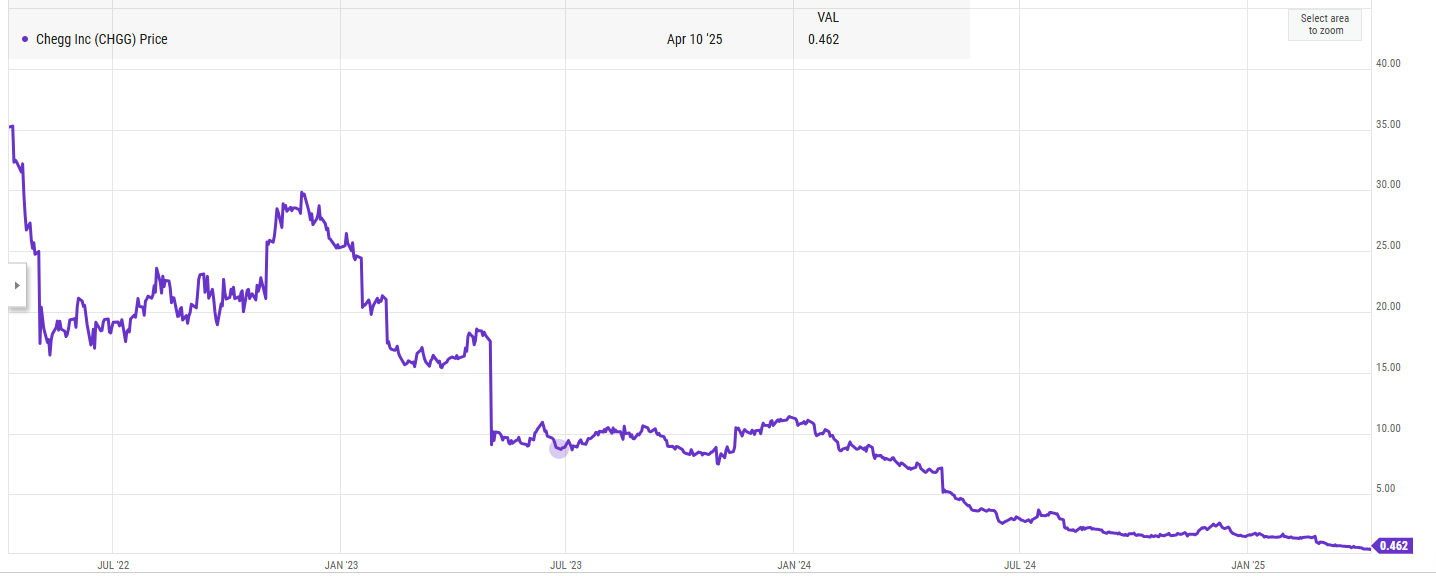
There’s a semi-famous story about why David Tepper named his fund Appaloosa; he did it because “Information used to be sent out from the brokerage firms by faxes, so if you were at the beginning of the alphabet, you got it 15 minutes faster.”
Tepper launched Appaloosa in the early 90s. Imagine if a few years passed and Tepper was kicking and screaming “no way we’re going to use email! This firm was founded on getting information over the fax machine and by regular mail. We’re going to stick to the research methods that have always served us and where we have an advantage!”
Seems crazy, right? I ask that rhetorically…. but yes, of course it would have been crazy for a bunch of reasons. If you’ll allow me a second to laugh at my own joke, it is pretty funny to think about maintaining your “edge” in fax communications while email is proliferating.
But I think that (admittedly silly) example illustrates nicely the dangers of being stuck in your old methods. It’s easy to get comfortable in the “old” ways of doing things or the tools you’re comfortable using, but eventually you’re forced to adapt / evolve or the market will just complete leave you behind.
When it comes to technology adoption, you could imagine bucketing users into two groups. To stick to our computer / email example, you could imagine one group who is set in their process and kind of begrudgingly starts using email / computers / internet once most of their other peers have adopted it and they have no choice (if you insist on communicating over pager / beeper, eventually you have to adopt email simply because no one has a pager / beeper anymore!)…. but you could imagine a second group that leans all in to computers / emails / internet the moment they see how much better it is for communication and updates. Think about those two groups for a second; how far ahead would the second group (the early adaptors) be from the first group? I’d have to imagine the answer is “lightyears”. They’d be trading emails and messages while their peers were still waiting on faxes or phone calls. They’d be using this new fangled “google” to research things while their peers were…. going to the library to check out industry magazines? I don’t know; I’m young enough that it’s hard for me to imagine people’s research process before google / the internet came along.
And I’d have to imagine that a team that early adopted computers / internet / email would have an edge in investments as well. If you started using the internet, maybe you’d have an inkling that traditional value favorites like newspapers were going to be in for a very, very rough go of it as the barriers to publishing and reaching people came down.
Obviously that’s a bit of a simplified / extreme hypothetical, but I think it’s a pretty plausible one and effectively illustrates my point: being an early adopter on a new technology is a huge edge on a bunch of lines. It not only can dramatically improve your research process, but it can even give you insights into businesses that might be value traps / melting icebergs in the new paradigm (as well as businesses that can be winners in the new world, though honestly calling winners in a new world is much harder than calling losers. It’s not hard to know that a legacy land line telephone maker is in trouble when mobile phones come around; calling the mobile phone handset winner (pun intended) is a much harder task!).
It seems pretty obvious to me that incorporating AI today is basically the same as incorporating email ~30 years ago. Eventually, every investor is going to do it. In fact, given the world just moves faster now and adopting AI is a much easier habit shift given we’re all addicted to our phones and computers anyway, I’d guess basically every investor has started adopting it already. And we’ve already seen AI kill several sectors / companies; look how quickly AI destroyed CHGG!
So, yes, everyone is already incorporating AI; I don’t think I talk to a single investor who doesn’t yet chatGPT or the like pretty extensively at this point….. but I will admit that I’m a little disappointed to date.
Don’t get me wrong: AI is great for investing productivity. In general, it’s way better than google search when you’re querying something, it’s ability to understand what you’re looking for has saved me countless hours of research1, and the deep research function is outstanding (multiple times, I’ve asked deep research to explain something after I’ve spent two days researching it, and it’s returned something more detailed than my two days of research within minutes).
But I’ve been thinking about how AI can be used to improve as an investor a while now (my first post on the subject was almost two years ago, and I wish I had just bought NVDA calls at the time instead of overthinking it!), and I’ve asked most of my peers / friends how they use AI in investing at some point or another multiple times over the past few years. In general, the investors I talk to limit their use of AI to two main functions:
They use AI as a time saving tool for more repetitive work
I’d throw using AI as an advanced google into this category, but there are a lot of other functions. I know a lot of investors who love using AI to “redline” 10-Ks (i.e. have AI compare a company’s 2024 10-k to its 2023 10-k and spot every difference).
They use AI to check / push back on their own work
Methods vary here, but the simple one I’ve seen is they’ll write down their investment thesis and upload it into their AI of choice. Then they’ll say something like, “pretend you are Warren Buffett; tell me what you think of this investment thesis.” I will admit to not loving this particular method, but it’s pretty popular IMO
Another method that I like a bit more: upload a bunch of relevant docs for a company (their 10-k, conference calls, etc.), and then ask the AI if a famous investor would buy that company (i.e. “pretend you are Warren Buffett; analyze this company’s filings and tell me if you would buy it.”). Again, not perfect, but I like this method slightly more than the prior one!
Why do I mention all of this? Two reasons:
The first reason I mention it is partly as a plug: I did a webinar with Daloopa’s founder, Thomas Li, on how different types of firms are using AI. Thomas has insight into how a wide range of financial institutions (big banks, hedge funds, private equity) are using AI, so I found the conversation really enlightening on a bunch of angles (where bigger firms are pushing the boundaries on AI, which parts of the business are getting most improved by AI, etc.).
The whole conversation was interesting… but there were two particular sections I’d call out as particularly interesting to my listeners. First, one of my favorite questions to ask people who work with a broad scope of firms is “tell me how AI usage / adoption defers between the clients who you think are at the cutting edge of AI adoption versus people who you think are just kind of average”, and Thomas’s answers and insights across a range of firms were really interesting. Second, one thing on my mind (that I might do a post on in the future) is “what hope is there for human investors / will AI replace us all in five years?” and I thought our discussion around that was really interesting as well.
The second reason I mention it is because I’m still looking to improve the use of AI in my investing, and I can’t help but feel like there should be more to AI. I thought about this a little, and I think the thing that is getting to me is this: all of the use cases I hear from other investors / listed above would qualify as productivity enhancement, and I know that’s mainly how I use AI right now: I use a clever AI search to learn in five minutes what would have taken me a day, or to automate some manual process that would have taken forever (I’ve talked about busted biotech a bunch recently; more than one investor has mentioned to me that they’ve bought a basket of cheap biotech companies and then used AI to draft letters to all of the basket’s boards at the same time).
Time is insanely valuable, so if productivity improvement is all AI does for me than it’s still a huge value add. But what is supposed to separate AI from other cool productivity tools (email, Zoom, etc.) is AI is supposed to be intelligent, and I’m not finding a ton of ways where I can use AI to make myself more thoughtful. It’s what separates talking to a smart friend versus a computer; when I have a good conversation with an intelligent investor friend, I normally come away with a bunch of follow up questions or new thoughts (true story: roughly 75% of the conversations I do in my monthly random ramblings are topics / questions that have evolved from a phone conversation between another investor2 and myself)… I generally just walk away feeling like I’m a slightly better / more thoughtful version of myself. I don’t ever feel that way when I interact with AI; sure, I’ll learn a new fact (an elephant weighs 5k pounds!), but I won’t learn something that deepens my understanding of the world or that I have ten follow on questions about.
So I’m still trying to figure out how to get more from AI in all aspects of my usage, and my second reason for writing this article is simple: if you’ve discovered some incredible ways to use AI to improve as an investor, whether that’s simple productivity improvements or the more type of holistic / intelligence improvements I’m discussing, I’d love to hear them!
PS- I will wrap it up with one last pitch for the Daloopa webinar: Thomas and I pressed stop on the recording and instantly said, “dang, that was a ton of fun!” If you’re interested in AI in investing, I think you’ll really enjoy it; you can sign up for the (free!) webinar here.
I’ve told this story before, but I’ll retell it here because it’s instructive: sometimes I like to see how management’s commentary on acquisitions has evolved. Previously that would mean me going through almost every company filing and transcript and needing to skim through it, a process that could take half a day (or more). With AI, I can simply ask them how has the company talked about acquisitions over time, and the AI will return every relevant results within seconds. Magic!
95% of the time that other investor is Artem Fokin!














I’ve been using AI extensively for investment research beyond search and typical productivity tasks. AI can be super useful in every aspect of investing research IMHO.
Btw, in the video podcast, I think there are multiple factual mistakes regarding how AI works and what AI could do...